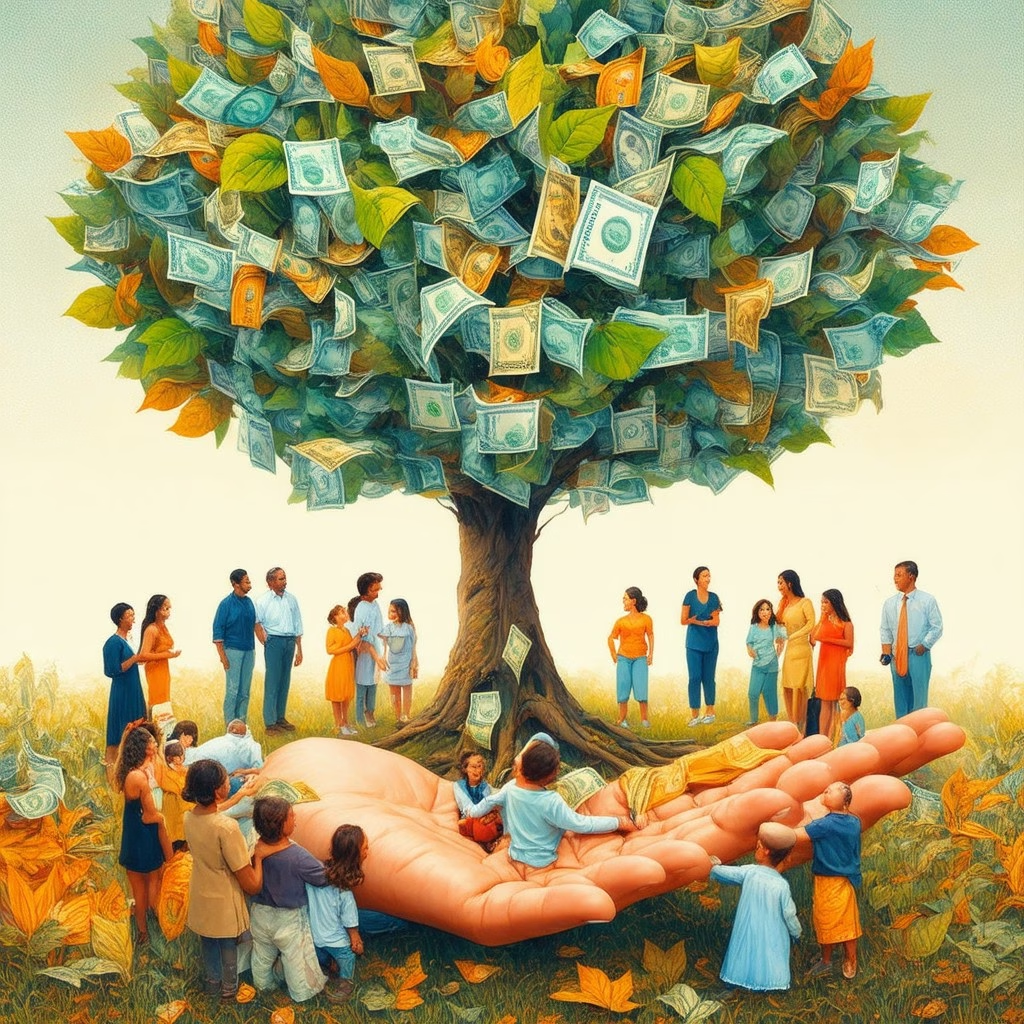Key Takeaways
- Access government help financially through various programs designed for immediate relief.
- Explore free money from the government via assistance programs like TANF and SNAP for basic needs.
- Understand eligibility criteria for debt relief programs to maximize your chances of receiving support.
- Utilize local financial help centers for personalized guidance and application assistance.
- Research hardship grants that provide non-repayable funds for urgent expenses like rent and medical bills.
- Take advantage of state-specific relief programs for tailored financial assistance in your area.
In today’s challenging economic landscape, many individuals find themselves asking, “How can I get money if I’m struggling?” Fortunately, there are numerous avenues for government help financially that can provide immediate relief. This article will delve into essential strategies to access free money from the government and explore various assistance programs designed to support those in need. We will guide you through understanding financial assistance from government programs, including the eligibility criteria for debt relief and hardship grants. Additionally, we will outline practical steps to quickly obtain free government money and highlight resources like financial help centers and free money helpers that can assist you in your time of need. Whether you’re wondering, “What free stuff can I get from the government?” or seeking immediate financial support, this comprehensive guide aims to equip you with the knowledge and tools necessary to navigate your options effectively.
Understanding Financial Assistance from Government Programs
If you’re facing financial difficulties, understanding the various government programs available can be a crucial step toward regaining stability. Financial assistance from government sources can provide the support you need to navigate tough times. These programs are designed to help individuals and families who are struggling to meet their basic needs, such as food, housing, and healthcare. By exploring these options, you can find the necessary resources to alleviate your financial burden.
Overview of Government Cash Assistance Programs
Government cash assistance programs are designed to provide immediate financial support to those in need. These programs can vary by state and may include options such as Temporary Assistance for Needy Families (TANF), Supplemental Nutrition Assistance Program (SNAP), and unemployment benefits. Each program has specific eligibility criteria, but they all aim to help individuals and families maintain a basic standard of living during challenging times.
To access these resources, start by visiting Benefits.gov, where you can find information about available programs in your area. Additionally, local financial help centers can guide you through the application process and help you understand what assistance you may qualify for.
Eligibility Criteria for Debt Relief Programs
Eligibility for government debt relief programs often depends on several factors, including income level, family size, and specific financial circumstances. To qualify for assistance, you may need to demonstrate financial hardship, such as job loss, medical expenses, or other unexpected costs. It’s essential to gather documentation that supports your claim, such as pay stubs, tax returns, and any relevant bills.
In many cases, you can apply for multiple programs simultaneously to maximize your chances of receiving support. For instance, if you need immediate cash assistance, consider exploring options like urgent financial help or caregiver support grants. Understanding the eligibility criteria for these programs can help you navigate the application process more effectively and secure the financial help you need.

Understanding Financial Assistance from Government Programs
When facing financial difficulties, understanding the various forms of financial assistance from government programs can be crucial. These programs are designed to provide support to individuals and families in need, helping them navigate through tough times. Whether you are looking for financial help with bills, housing, or other essential needs, there are resources available to assist you.
Overview of Government Cash Assistance Programs
Yes, there are several government debt relief programs designed to assist individuals in managing their financial obligations. Here are some key options:
- Debt Management Plans: Managed by credit counseling agencies, these plans involve negotiating with creditors to establish a manageable payment plan tailored to your financial situation. The National Foundation for Credit Counseling (NFCC) is a reputable organization that can help you find certified credit counselors.
- Student Loan Forgiveness: Programs such as the Public Service Loan Forgiveness (PSLF) allow borrowers to have their remaining federal student loan balance forgiven after making 120 qualifying payments while working full-time in a public service job. The U.S. Department of Education provides detailed information on eligibility and application processes.
- VA Home Loan Debt Assistance: Veterans with VA-backed home loans facing difficulties with mortgage payments may qualify for assistance programs that help prevent foreclosure. The U.S. Department of Veterans Affairs offers resources and guidance for veterans in need.
- Medical Debt Assistance: Government health insurance programs, including Medicaid, Medicare, and the Children’s Health Insurance Program (CHIP), can help cover medical expenses for eligible individuals and families. These programs aim to alleviate the burden of healthcare costs.
- IRS Debt Relief: The Internal Revenue Service (IRS) provides various options for taxpayers struggling with tax debts, including installment agreements, offers in compromise, and penalty abatement. The IRS website offers comprehensive resources for understanding these options.
- Consumer Financial Protection Bureau (CFPB): The CFPB is a federal agency that helps consumers navigate financial challenges, including filing complaints against unfair financial practices. They provide educational resources and tools to assist individuals in managing their debts effectively.
For more information on these programs, you can visit the respective government websites or consult with a financial advisor to explore the best options for your situation.
Eligibility Criteria for Debt Relief Programs
To qualify for government debt relief programs, individuals must meet specific eligibility criteria, which can vary by program. Generally, these criteria may include:
- Income Level: Many programs require applicants to demonstrate financial need, often based on income thresholds set by the government.
- Type of Debt: Some programs are tailored for specific types of debt, such as student loans, medical bills, or credit card debt.
- Residency Requirements: Applicants may need to be residents of the state or locality offering the assistance.
- Documentation: Providing necessary documentation, such as proof of income, debt statements, and identification, is typically required during the application process.
Understanding these criteria can help you determine if you can access financial assistance from government programs effectively. If you have questions about your eligibility, consider reaching out to a financial help center for guidance.
How to Get Money from the Government Right Now?
If you’re in urgent need of financial assistance, there are several avenues to explore for accessing free money from the government quickly. Understanding the steps to take can help alleviate your financial burden and provide immediate support.
Steps to Access Free Government Money Quickly
To access financial assistance from the government immediately, consider the following options:
- Unemployment Insurance (UI): If you have lost your job or had your hours reduced due to the COVID-19 pandemic, you may qualify for unemployment benefits. These benefits provide cash payments based on your previous earnings. Apply through your state’s unemployment office for expedited processing.
- Economic Impact Payments (Stimulus Checks): The federal government has issued multiple rounds of stimulus checks to eligible individuals. If you have not received your payment, check your eligibility and filing status through the IRS website. Ensure you have filed your 2020 tax return, as this is crucial for determining your eligibility.
- Child Tax Credit (CTC): Families with children may qualify for the expanded Child Tax Credit, which provides monthly payments to eligible families. To receive these payments, ensure you have filed your tax returns for 2020 or 2019, as this will determine your eligibility.
- State-Specific Relief Programs: Many states have implemented their own relief programs, including direct cash assistance, rental assistance, and food aid. Visit your state’s official government website to find specific programs available in your area.
- Local Nonprofits and Charities: Organizations such as the United Way and local food banks may offer immediate financial assistance or resources for those in need. Reach out to these organizations for support.
Utilizing Financial Help Centers for Immediate Assistance
Financial help centers are invaluable resources for individuals seeking immediate support. These centers can guide you through the process of applying for various government assistance programs. Here are some key benefits of utilizing these centers:
- Personalized Guidance: Financial help centers provide tailored advice based on your unique situation, helping you identify the best programs for which you may qualify.
- Access to Resources: Many centers offer access to a wide range of resources, including information on free government money, local charities, and nonprofit organizations that can provide additional support.
- Application Assistance: Staff at these centers can assist you with filling out applications for government aid, ensuring that you meet all necessary criteria and deadlines.
- Workshops and Educational Programs: Some financial help centers offer workshops that educate individuals on managing finances, budgeting, and understanding government assistance programs.
For more information on available resources, consider visiting financial assistance resources or urgent financial help.
What free stuff can I get from the government?
Government benefits and assistance programs provide various free resources to eligible individuals and families. Here are some key types of support available:
- Food Assistance: Programs like the Supplemental Nutrition Assistance Program (SNAP) offer financial assistance for purchasing food. According to the USDA, SNAP helps millions of Americans access nutritious food.
- Health Insurance: The Affordable Care Act (ACA) provides options for free or low-cost health insurance through Medicaid and the Children’s Health Insurance Program (CHIP). These programs ensure that low-income families receive necessary medical care.
- Housing Assistance: The Department of Housing and Urban Development (HUD) offers programs such as Section 8 housing vouchers, which help low-income families afford safe and decent housing.
- Utility Bill Assistance: The Low-Income Home Energy Assistance Program (LIHEAP) helps eligible households pay for heating and cooling costs, ensuring that families can maintain a safe living environment.
- Welfare and Financial Assistance: Temporary Assistance for Needy Families (TANF) provides financial support to families in need, helping them achieve self-sufficiency.
- Social Security Benefits: Social Security provides financial assistance to retirees, disabled individuals, and survivors of deceased workers. This program is crucial for many Americans’ financial stability.
- Government Checks and Payments: Various programs offer direct payments to eligible individuals, such as unemployment benefits and stimulus checks during economic downturns.
For more detailed information on these benefits, you can visit USAGov, which serves as a comprehensive resource for government services and assistance programs.
How to Get Free Money from the Government for Essential Needs
If you are in need of immediate financial support, understanding how to access free money from the government is crucial. Here are steps to guide you:
- Identify Your Needs: Determine what type of assistance you require, whether it’s food, housing, or utility bill help.
- Research Available Programs: Utilize resources like Benefits.gov to find programs that match your needs.
- Gather Required Documentation: Prepare necessary documents such as proof of income, identification, and any other required information to apply for assistance.
- Apply for Assistance: Follow the application process for the programs you qualify for. Many applications can be completed online for convenience.
- Contact a Financial Help Center: If you need guidance, reach out to a local financial help center for personalized assistance and support.
By following these steps, you can effectively navigate the process of obtaining free government money to meet your essential needs.

What is a hardship grant?
A hardship grant is a form of financial assistance designed to support individuals facing unexpected financial difficulties without the obligation to repay the funds. Unlike loans, which require repayment with interest, hardship grants provide immediate relief for essential needs. These grants can cover a variety of unplanned expenses, including:
- Rent and Housing Costs: Assistance for individuals struggling to pay rent or facing eviction, including mortgage assistance and emergency shelter aid.
- Medical Expenses: Coverage for unexpected medical bills, including hospital stays, surgeries, and prescription medications.
- Utilities: Help with paying utility bills to prevent disconnection of essential services such as electricity, water, and gas.
- Food Assistance: Support for purchasing groceries or accessing food banks during times of financial strain.
- Transportation Costs: Aid for necessary travel expenses, including public transportation or vehicle repairs, to maintain employment or access essential services.
Hardship grants are typically provided by non-profit organizations, government agencies, and community foundations. For example, the U.S. Department of Health and Human Services (HHS) offers various programs that may include hardship grants for eligible individuals facing financial crises. Additionally, platforms like GoFundMe have emerged as a means for individuals to seek community support for their specific hardships.
For more detailed information on available hardship grants, individuals can visit resources such as the National Low Income Housing Coalition or local government websites that provide guidance on financial assistance programs.
How to Apply for a $7,000 Government Grant for Individuals
Applying for a $7,000 government grant can be a straightforward process if you understand the necessary steps. Here’s how to get free money from the government through hardship grants:
- Research Available Grants: Start by identifying grants that fit your needs. Websites like Benefits.gov can help you find government assistance programs tailored to your situation.
- Check Eligibility: Review the eligibility criteria for each grant. Many hardship grants require proof of financial need, so gather necessary documentation such as income statements and bills.
- Complete the Application: Fill out the application form accurately. Be sure to provide all requested information and attach any required documents to support your claim.
- Submit Your Application: Follow the submission guidelines carefully. Some grants may require online applications, while others may need to be mailed in.
- Follow Up: After submitting your application, check back to ensure it has been received and inquire about the timeline for decisions.
By following these steps, you can increase your chances of receiving financial assistance from government programs, helping you navigate through tough financial times.
Understanding Financial Assistance from Government Programs
When facing financial difficulties, understanding the various government assistance programs available can be crucial. These programs are designed to provide financial help from the government to individuals and families in need. They can include cash assistance, food support, and housing aid, among other resources. By exploring these options, you can find the necessary support to alleviate your financial burdens.
Overview of Government Cash Assistance Programs
Government cash assistance programs are vital for those who need immediate financial relief. These programs often include:
- Temporary Assistance for Needy Families (TANF): Provides cash benefits to low-income families with children.
- Supplemental Security Income (SSI): Offers financial assistance to individuals with disabilities or those aged 65 and older.
- General Assistance (GA): Available in some states, GA provides cash aid to individuals who do not qualify for other assistance programs.
- Emergency Cash Assistance: Many states have programs that offer one-time cash assistance for urgent needs, such as rent or utility bills.
For more detailed information on these programs, you can visit Benefits.gov, which provides a comprehensive overview of available government benefits.
Eligibility Criteria for Debt Relief Programs
To qualify for government debt relief programs, applicants must meet specific eligibility criteria, which can vary by program. Common requirements include:
- Income Level: Many programs require applicants to demonstrate financial need, often based on income thresholds.
- Residency: Applicants typically must be residents of the state where they are applying for assistance.
- Documentation: Providing necessary documentation, such as proof of income, identification, and details of debts, is often required.
Understanding these criteria can help you determine if you can access free money from the government for debt relief. For more information on specific programs, check out assistance with bills and other resources tailored to your needs.
How can I get money if I’m struggling?
Understanding Financial Assistance from Government Programs
If you’re facing financial difficulties, understanding the various government programs available can be crucial. Financial assistance from government sources can provide immediate relief for those in need. Programs such as Temporary Assistance for Needy Families (TANF) and Supplemental Nutrition Assistance Program (SNAP) are designed to help individuals and families meet their basic needs. Additionally, many states offer specific programs that provide free money from the government for housing, utilities, and medical expenses. To explore these options, visit Benefits.gov for comprehensive information on eligibility and application processes.
Exploring Free Money Helpers for Immediate Support
There are numerous free money helpers available to assist individuals in urgent financial situations. Nonprofit organizations, local charities, and community action agencies often provide resources to help you access free government money. These organizations can guide you through the application process for various assistance programs, ensuring you receive the financial help you need. For immediate support, consider contacting a financial help center in your area, which can connect you with local resources tailored to your specific needs. You can also check out financial assistance resources for more information on available programs.




